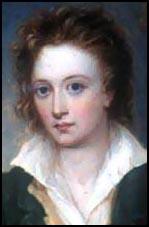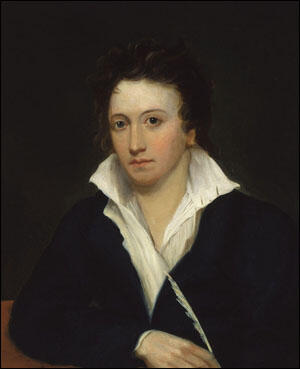Percy Bysshe Shelley

Percy Bysshe Shelley, the son of Sir Timothy Shelley, the M.P. for New Shoreham, was born at Field Place near Horsham, in 1792. Sir Timothy Shelley sat for a seat under the control of the Duke of Norfolk and supported his patron's policies of electoral reform and Catholic Emancipation.
Shelley was educated at Eton and Oxford University and it was assumed that when he was twenty-one he would inherit his father's seat in Parliament. As a young man he was taken to the House of Commons where he met Sir Francis Burdett, the Radical M.P. for Westminster. Shelley, who had developed a strong hatred of tyranny while at Eton, was impressed by Burdett, and in 1810 dedicated one of his first poems to him. At university Shelley began reading books by radical political writers such as Tom Paine and William Godwin.
At university Shelley wrote articles defending Daniel Isaac Eaton, a bookseller charged with selling books by Tom Paine and the much persecuted Radical publisher, Richard Carlile. He also wrote The Necessity of Atheism, a pamphlet that attacked the idea of compulsory Christianity. Oxford University was shocked when they discovered what Shelley had written and on 25th March, 1811 he was expelled.
Shelley eloped to Scotland with Harriet Westbrook, a sixteen year old daughter of a coffee-house keeper. This created a terrible scandal and Shelley's father never forgave him for what he had done. Shelley moved to Ireland where he made revolutionary speeches on religion and politics. He also wrote a political pamphlet A Declaration of Rights, on the subject of the French Revolution, but it was considered to be too radical for distribution in Britain.
Percy Bysshe Shelley returned to England where he became involved in radical politics. He met William Godwin the husband of Mary Wollstonecraft, the author of Vindication of the Rights of Women. Shelley also renewed his friendship with Leigh Hunt, the young editor of The Examiner. Shelley helped to support Leigh Hunt financially when he was imprisoned for an article he published on the Prince Regent.
Leigh Hunt published Queen Mab, a long poem by Shelley celebrating the merits of republicanism, atheism, vegetarianism and free love. Shelley also wrote articles for The Examiner on polical subjects including an attack on the way the government had used the agent provocateur William Oliver to obtain convictions against Jeremiah Brandreth.

In 1814 Shelley fell in love and eloped with Mary, the sixteen-year-old daughter of William Godwin and Mary Wollstonecraft. For the next few years the couple travelled in Europe. Shelley continued to be involved in politics and in 1817 wrote the pamphlet A Proposal for Putting Reform to the Vote Throughout the United Kingdom. In the pamphlet Shelley suggested a national referendum on electoral reform and improvements in working class education.
Percy Bysshe Shelley was in Italy when he heard the news of the Peterloo Massacre. He immediately responded by writing The Mask of Anarchy, a poem that blamed Lord Castlereagh, Lord Sidmouth and Lord Eldon for the deaths at St. Peter's Fields. In The Call to Freedom Shelley ended his argument for non-violent mass political protest with the words: "Which in sleep had fallen on you - Ye are many - they are few."
In 1822 Shelley, moved to Italy with Leigh Hunt and Lord Byron where they published the journal The Liberal. By publishing it in Italy the three men remained free from prosecution by the British authorities. The first edition of The Liberal sold 4,000 copies. Soon after its publication, Percy Bysshe Shelley was lost at sea on 8th July, 1822 while sailing to meet Leigh Hunt.
Primary Sources
(1) Percy Bysshe Shelley, The Examiner (9th November, 1817)
On the 7th November, Brandreth, Turner and Ludlam ascended the scaffold. We feel for Brandreth the less, because it seems he killed a man. But recollect who instigated him to the proceedings which led to murder. On the word of a dying man, Brandreth tells us, that "Oliver brought him to this" - that, "but for Oliver, he would not have been there." See, too, Ludlam and Turner, with their sons and brothers, and sisters, how they kneel together in this dreadful agony of prayer. With that dreadful penalty before their eyes - with that tremendous sanction for the truth of all he spoke, Turner exclaimed loudly and distinctly, while the executioner was putting the rope round his neck, "This is all Oliver and the government." What more he might have said we know not, because the chaplain prevented any further observations. Troops of horse, with keen and glittering swords, hemmed in the multitudes collected to witness this abominable exhibition. "When the stroke of the axe was heard, there was a burst of horror from the crowd. The instant the head was exhibited, there was a tremendous shriek set up, and the multitude ran violently in all directions, as if under the impulse of sudden frenzy. Those who resumed their stations, groaned and hooted."
(2) Percy Bysshe Shelley, The Mask of Anarchy (1819)
As I lay asleep in Italy,
There came a voice from over the Sea,
And with great power it forth led me
To walk in the visions of Poesy.
I met Murder on the way -
He had a mask like Castlereagh -
Very smooth he looked, yet grim;
Seven blood-hounds followed him;
All were fat; and well they might
Be in admirable plight,
For one by one, and two by two,
He tossed them human hearts to chew
Which from his wide cloak he drew.
Next came Fraud, and he had on,
Like Eldon, an ermined gown;
His big tears, for he wept well,
Turned to millstones as they fell.
And the little children, who
Round his feet played to and fro,
Thinking every tear a gem,
Had their brains knocked out by them.
Clothed with the Bible, as with light,
And the shadows of the night,
Like Sidmouth, next, Hypocrisy
On a crocodile rode by.
And many more Destructions played
In this ghastly masquerade,
All disguised, even to the eyes,
Like Bishops, lawyers, peers, and spies.
Last came Anarchy: he rode
On a white horse, splashed with blood;
He was pale even to the lips,
Like Death in the Apocalypse.
And he wore a kingly crown:
And in his grasp a sceptre shone;
On his brow this mark I saw -
'I AM GOD, AND KING, AND LAW!'
(3) Percy Bysshe Shelley, The Call to Freedom (1819)
From the workhouse and the prison
Where pale as corpses newly risen,
Women, children, young and old
Groan for pain, and weep for cold -
From the haunts of daily life
Where is waged the daily strife
With common wants and common cares
Which sows the human heart with tares -
Lastly from the palaces
Where the murmur of distress
Echoes, like the distant sound
Of a wind alive around
Those prison halls of wealth and fashion
Where some few feel such compassion
For those who groan, and toil, and wail
As must make their brethren pale -
Ye who suffer woes untold,
Or to feel, or to be behold
Your lost country bought and sold
With a price of blood and gold -
Let a vast assembly be,
And with great solemnity
Declare with measured words that ye
Are, as God has made ye, free -
And these words shall then become
Like Oppression's thunder doom
Ringing through each heart and brain,
Heard again - again - again
Rise like Lions after slumber
In unvanquishable number -
Shake your chains to earth like dew
Which in sleep had fallen on you -
Ye are many - they are few.
(4) Percy Bysshe Shelley, letter to a friend in 1817.
It is impossible to know how far the higher members of the Government are involved in the guilt of their infernal agents. But this much is known, that so soon as the whole nation lifted up its voice for parliamentary reform, spies went forth. These were selected from the most worthless and infamous of mankind, and dispersed among the multitude of famished and illiterate labourers. It was their business to find victims, no matter whether right or wrong.

